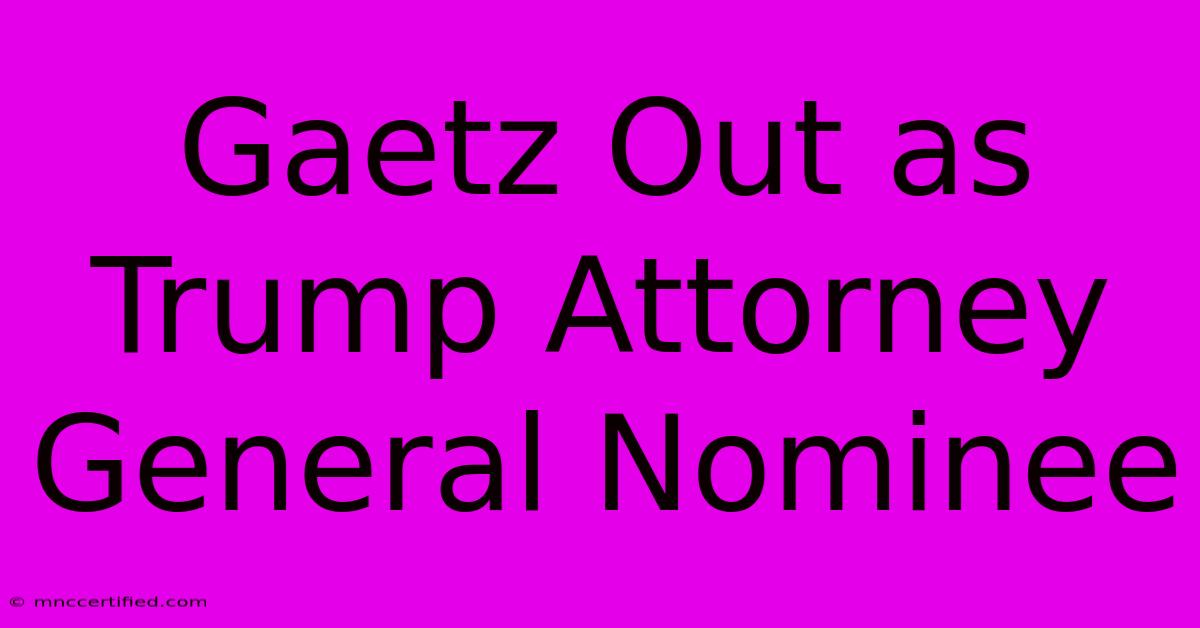Gaetz Out As Trump Attorney General Nominee

Table of Contents
Gaetz Out as Trump Attorney General Nominee: A Political Earthquake
The unexpected withdrawal of Matt Gaetz's nomination as Attorney General under a hypothetical second Trump presidency has sent shockwaves through the political landscape. While this scenario is purely speculative, exploring the potential reasons behind such a hypothetical withdrawal offers valuable insight into the complex dynamics of American politics. This article delves into the potential factors contributing to this imagined scenario, examining both the immediate and long-term consequences.
The Speculative Scenario: Why Gaetz's Nomination Might Have Failed
Several factors could have contributed to a hypothetical failure of Gaetz's nomination, ranging from his controversial past to broader political considerations.
Controversies and Investigations: A Major Hurdle
Gaetz's past has been marked by numerous controversies, including a federal investigation into alleged sex trafficking and campaign finance violations. These investigations, regardless of their outcome, would have undoubtedly cast a long shadow over his nomination. The Senate confirmation process is notoriously rigorous, and a nominee facing such serious allegations would likely face intense scrutiny. Confirmation would have been highly unlikely given the gravity of these issues. This makes a hypothetical withdrawal almost inevitable.
Lack of Broad Support Within the Republican Party
While Gaetz enjoys a dedicated following among a certain segment of the Republican electorate, his support within the party as a whole is far from universal. Many Republicans, even those aligned with Trump, might have viewed his nomination as too risky, potentially damaging to the party's image and electoral prospects. The potential for a deeply divisive confirmation battle likely played a major role in any hypothetical decision to withdraw his name.
Public Opinion and Media Scrutiny: A Constant Threat
The intense media scrutiny that Gaetz invariably attracts would have amplified any negative aspects of his candidacy. Public opinion plays a significant role in the success or failure of political nominations, and a highly controversial nominee like Gaetz would likely have faced intense public backlash. This pressure, coupled with the potential for damaging leaks and revelations during the confirmation process, likely influenced the hypothetical decision.
The Implications of Gaetz's Hypothetical Withdrawal
The hypothetical withdrawal of Gaetz's nomination carries significant implications, affecting both the Republican party and the broader political landscape.
Impact on the Republican Party: Internal Divisions Exposed
Gaetz's hypothetical withdrawal highlights the internal divisions within the Republican party. It would expose the struggle between those seeking to embrace a more extreme, populist wing and those seeking to present a more moderate, electable image. This internal conflict would likely continue to shape the party's future.
Impact on the Broader Political Landscape: Uncertainty and Instability
The uncertainty surrounding the Attorney General nomination would have created broader political instability. The Attorney General is a critical position, and a prolonged vacancy or a controversial appointment could have significant consequences for the justice system and the country's overall political climate.
Conclusion: A Hypothetical Scenario with Real-World Implications
While Matt Gaetz's nomination as Attorney General under a hypothetical second Trump administration is purely speculative, exploring the potential reasons behind its failure provides valuable insights into the dynamics of American politics. The controversies surrounding Gaetz, the internal divisions within the Republican party, and the pressure of public opinion all point to a highly challenging path to confirmation. This hypothetical scenario underscores the importance of careful consideration of a candidate’s background and the potential impact of nominations on the broader political landscape. The exploration of this scenario highlights the fragility of political power and the importance of public scrutiny in the nomination process.

Thank you for visiting our website wich cover about Gaetz Out As Trump Attorney General Nominee. We hope the information provided has been useful to you. Feel free to contact us if you have any questions or need further assistance. See you next time and dont miss to bookmark.
Featured Posts
-
Trump Names Bondi To Us Position
Nov 22, 2024
-
Plymouth Boss Rooney Enjoying Life Away From Coleen
Nov 22, 2024
-
Womens Match Preview Arsenal Vs Juventus
Nov 22, 2024
-
2025 Qb Lewis Jackson State Bound
Nov 22, 2024
-
Strictlys Jowita Swaps Partners
Nov 22, 2024